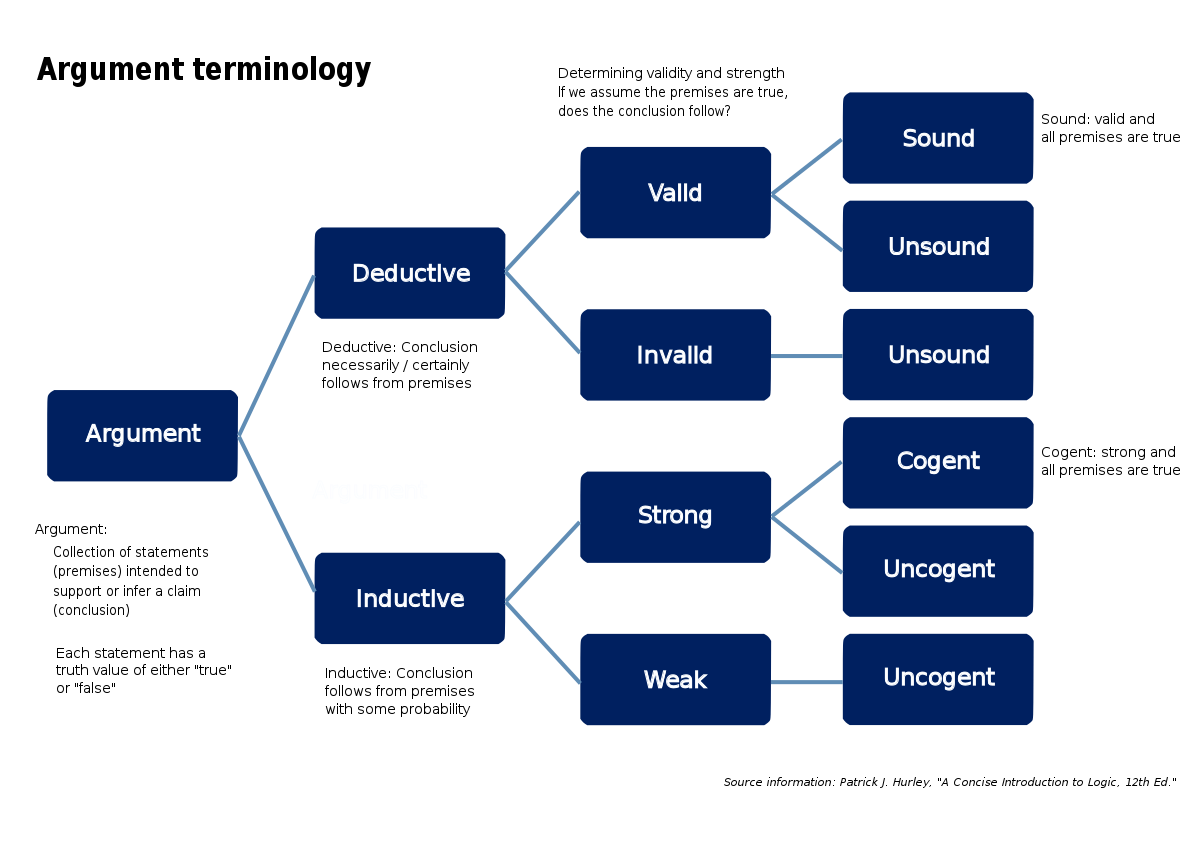steve_bank
Diabetic retinopathy and poor eyesight. Typos ...
Are you a logical thinker? How do you know when your logic is correct?
We all learn informal logic as we grow up by immersion in society without any formal definitions. Formal logic reduces it to a set of symbols which have specific definitions. AND, OR for example.
Which cam first, informal logic as patrt of language or formal structures?
Formal logic is consistent in that for lofic inputs th outpus are predictable and unique. No subjective interpretation. However GIGO applies, garbage in garbage out. Informal logfic and reasoning put to formal logic does not mean the reasoning and logic is a true inference in reality.
 en.wikipedia.org
en.wikipedia.org
 en.wikipedia.org
en.wikipedia.org

 en.wikipedia.org
en.wikipedia.org
We all learn informal logic as we grow up by immersion in society without any formal definitions. Formal logic reduces it to a set of symbols which have specific definitions. AND, OR for example.
Which cam first, informal logic as patrt of language or formal structures?
Formal logic is consistent in that for lofic inputs th outpus are predictable and unique. No subjective interpretation. However GIGO applies, garbage in garbage out. Informal logfic and reasoning put to formal logic does not mean the reasoning and logic is a true inference in reality.
Philosophy of logic - Wikipedia
Philosophy of logic is the area of philosophy that studies the nature of logic.[1][2] Like many other disciplines, logic involves various philosophical presuppositions which are addressed by the philosophy of logic.[3] The philosophy of logic can be understood in analogy to other discipline-specific branches of philosophy: just like the philosophy of science investigates philosophical problems raised by science, so the philosophy of logic investigates philosophical problems raised by logic.[4]
An important question studied by the philosophy of logic is how logic is to be defined, for example, in terms of valid inference or of logical truth.[5] This includes the issue of how to distinguish logical from non-logical formal systems.[3] It is especially relevant for clarifying the relation between the various proposed logical systems, both classical and non-classical, and for evaluating whether all of these systems actually qualify as logical systems.[4] The philosophy of logic also investigates how to understand the most fundamental concepts of logic, like truth, premises, conclusions, inference, argument, and validity.[4] It tries to clarify the relation between logic and other fields, such as ontology, mathematics, and psychology.[2][6][1]
Formal system - Wikipedia
en.wikipedia.org
A formal system is an abstract structure used for inferring theorems from axioms according to a set of rules. These rules, which are used for carrying out the inference of theorems from axioms, are the logical calculus of the formal system. A formal system is essentially an "axiomatic system".[1]
In 1921, David Hilbert proposed to use such a system as the foundation for the knowledge in mathematics.[2] A formal system may represent a well-defined system of abstract thought.
The term formalism is sometimes a rough synonym for formal system, but it also refers to a given style of notation, for example, Paul Dirac's bra–ke
List of logic symbols - Wikipedia

Informal logic - Wikipedia
Informal logic encompasses the principles of logic and logical thought outside of a formal setting (characterized by the usage of particular statements). However, the precise definition of "informal logic" is a matter of some dispute.[1] Ralph H. Johnson and J. Anthony Blair define informal logic as "a branch of logic whose task is to develop non-formal standards, criteria, procedures for the analysis, interpretation, evaluation, criticism and construction of argumentation."[2] This definition reflects what had been implicit in their practice and what others were doing in their informal logic texts.
Informal logic is associated with informal fallacies, critical thinking, the thinking skills movement[3] and the interdisciplinary inquiry known as argumentation theory. Frans H. van Eemeren writes that the label "informal logic" covers a "collection of normative approaches to the study of reasoning in ordinary language that remain closer to the practice of argumentation than formal logic."[4]
